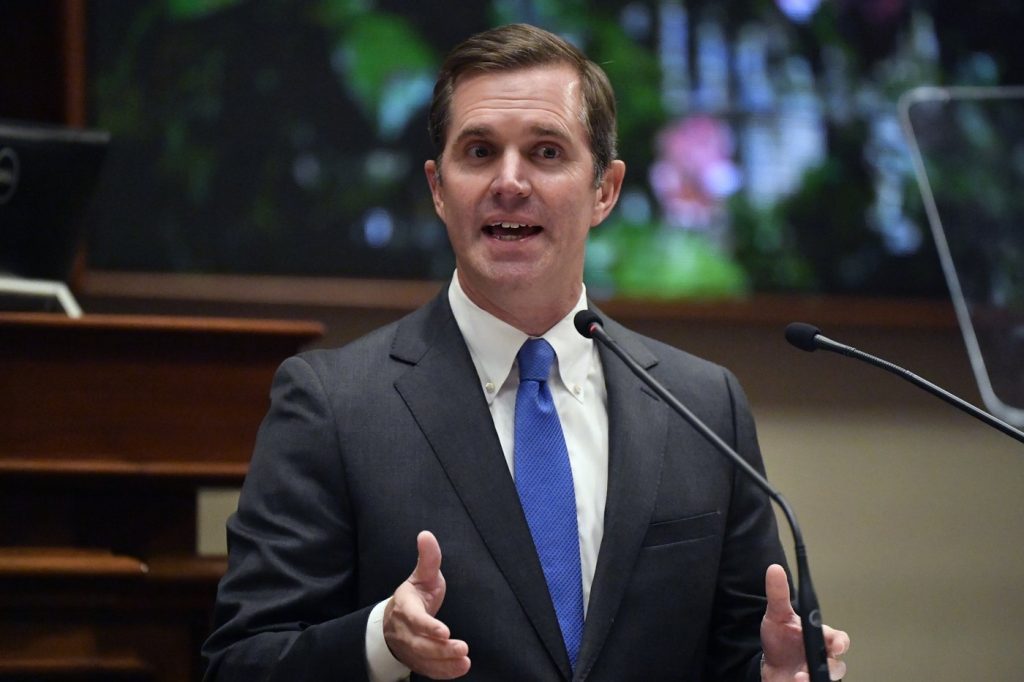FRANKFORT, Ky. (AP) — Democratic Governor Andy Beshear of Kentucky has exercised his veto power against several bills sent to him by the Republican-controlled state legislature, tackling contentious issues such as abortion, Medicaid, and diversity initiatives. Despite the challenges he faces in a Republican-dominated political landscape, the vetoes are seen as a reaffirmation of his core values and political beliefs as speculation mounts about a potential presidential run in 2028.
According to Democratic political strategist Mark Riddle, Beshear’s actions reflect his authenticity and ideology. Riddle notes that these vetoes not only highlight Beshear’s stance on key issues but also provide a clear narrative that could resonate with a national audience. Beshear emphasized his principles in a statement: “By now, Kentuckians know that I’ll always do what I believe is right, and the right thing here was to veto these bills.” His persistent opposition to the Republican majority has positioned him as a figure of interest within Democratic circles at the national level.
Despite his vetoes, the Republican supermajority in the Kentucky legislature swiftly overturned them, following a well-established pattern at the end of legislative sessions during Beshear's tenure. For years, this dynamic has led to a visible divide between the two parties, especially on cultural issues like abortion, conversion therapy, and diversity, equity, and inclusion (DEI) initiatives. Republican lawmakers continued their override of Beshear’s vetoes, reaffirming their control over legislative outcomes.
Former Kentucky state Senator Damon Thayer, who has been a part of the Republican leadership, remarked that Beshear’s vetoes expose him as a “traditional liberal Democrat.” Thayer expressed frustration that the public seems to overlook Beshear’s opposition to bills that align with the majority opinion in Kentucky. However, it is essential to note that the bills signed by Beshear outnumber his vetoes significantly, and he has partnered with Republicans on several substantial pieces of legislation, including medical marijuana and sports betting, demonstrating a level of bipartisanship at times.
The recent veto battles have further spotlighted the contentious atmosphere in Kentucky’s divided government, particularly on issues dear to both sides. For instance, proponents of a bill regarding abortion argued that it would provide necessary clarity for doctors operating under Kentucky’s strict abortion laws. However, Beshear countered that the measure would potentially risk the lives of pregnant women facing medical emergencies, siding with abortion-rights supporters in his remarks.
In another instance, Beshear vetoed legislation aimed at dismantling DEI efforts in public universities. He framed his decision around his religious beliefs, stating that diversity should be viewed as a strength rather than a hindrance. “I believe in the Golden Rule that says we love our neighbor as ourselves,” he stated, underscoring his commitment to inclusion. Similarly, in vetoing a bill related to Medicaid that introduced a work requirement for able-bodied adults, Beshear warned that vulnerable adults could lose essential health coverage, though Republicans insisted on the necessity of personal accountability.
Additionally, Beshear characterized conversion therapy as “torture” and rejected a measure that would have safeguarded access to this discredited practice. His veto message highlighted the need for policymakers to protect children from harmful and outdated methods, asserting that legislation should focus on the health and well-being of the youth.
Ultimately, these recent actions by Governor Andy Beshear signify a broader struggle in Kentucky politics, encapsulating the ideological divide between the Democratic governor and the Republican legislature. This struggle not only defines the current political landscape in Kentucky but also positions Beshear as a potential player on the national stage, particularly as he navigates the complexities of a divided government while holding firm to his principles.










